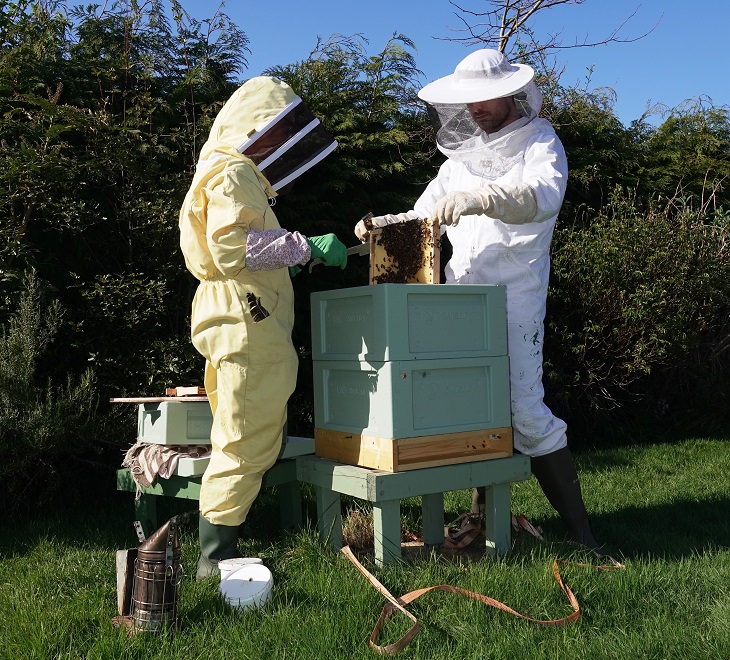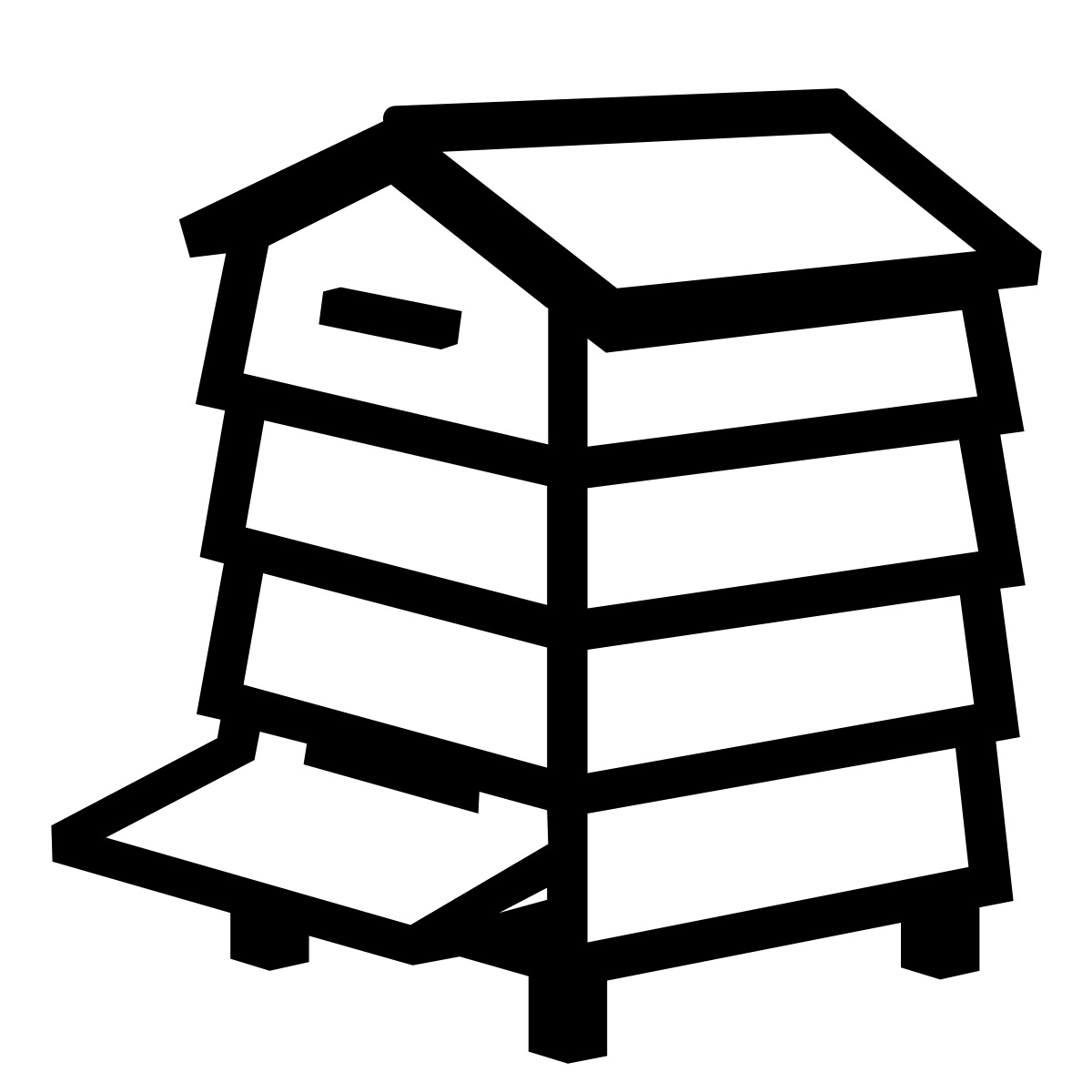
It’s exciting returning as chairperson to my local association committee after a few years off to do other things and allow changes in leadership and club development to happen without my involvement. The exciting part now is working in a team of highly motivated people the majority of whom are heading in the same direction; towards increasing educational opportunities. What’s more, most of the committee members are of a younger age, than previously was the case, and have bags of energy and enthusiasm on their side.
Training Apiary.
A training apiary takes the pressure off individual beekeepers who open up their apiaries for beginner training. It can be hard on colonies being manipulated by inexperienced beekeepers and a training apiary provides the ideal learning environment while being owned by everyone.
Our association doesn’t have one yet but we are hoping to establish one.The hard work involved with investigating the feasability of a training apiary and classroom is currently being shared across a sub-committee that reports to the main committee at each stage of the process. These facilities would become the linchpin of our education set up besides being a social hub.
Education Team.
The education team is led by Fiona who coordinates several sub-committees. Fiona has been beekeeping for a long time and also has a solid professional background in education. She is a whizz at putting together relevant up- to- date material and making and delivering PowerPoint presentations. Single handed she ran the beginner courses but now has a team to share the load with and I know it makes her happy.
Jane supports beekeepers studying for the modular exams and arranges peer support groups, and encourages people to advance their keeping knowledge by getting onto the education pathway. Gelda and Mary-Ann are putting together a programme to support people preparing for the first practical exam, the Basic Beekeeper Certificate.
Bee Buddy System.
Heather coordinates our new Bee Buddying scheme which gladdens my heart more than you can imagine for it shares the load of supporting new beekeepers more evenly across the association which is full of great beekeepers with loads of experience. Heather started beekeeping a few years ago and took to it like a duck to water successfully managing around 10 productive colonies fairly quickly. She produces honey for sale and paints her hives in gloriously bright and varied colours.
I’ve been mentoring for years and attribute much of my practical beekeeping development to experiences gained supporting others and facing lots of different situations in colonies of honey bees. Looking back at my mentoring log, I notice that I spent 118 hours mentoring in the beekeeping season 2015. Most of my time was spent visiting learners in their own apiaries, but I answered phone calls and gave advice. As new mentors stepped forward, my time has reduced to 33 hours mentoring in 2020, and to a more manageable 15 hours last year.
Setting up a System.
Heather’s strategy has been firstly to contact experienced beekeepers and find out if they are willing to buddy up with a beekeeper newly finished Fiona’s last beginner course. Then she studies the addresses and geography of everyone involved which is important in the Scottish Highland where distances between beekeepers can be large. She matches up the mentees with mentors living relatively close by and phones the mentees to tell them that they had a named mentor and, being mindful of data protection, she asked permission to give their contact details to the mentor who would contact them. We agreed to use the more relaxed and less formal title of Bee Buddy. To simplify things, Heather didn’t offer mentees a choice of mentor but plans to ask for feedback and assess the success of the pairings. Any incompatibilities can be sorted out later.
To avoid confusion, I refer to mentors and mentees as I tease out the topic and share information that may help others set this up for their local beekeeping associations, or enable mentees find a mentor themselves.
Last year, I wrote a blog on mentoring:Who Needs a Mentor? (beelistener.co.uk) This follow-up explores the subject in a bit more depth.
The Goals of Mentoring.
What are the goals of mentoring? If you were like me and didn’t have a named mentor then you probably took ages to grasp some of the essentials like swarm behaviour, prevention and control. My learning curve was so steep I got vertigo, not to mention sleepless nights during swarm season wondering how to manage the colonies. I’ve never lost a colony over winter but I’ve let varroa get out of control in the past. So, the main goals of mentoring are to improve bee health by flattening the learning curve and enabling people to manage colonies well. Another goal is promoting and increasing the retention of beekeepers who might otherwise give up due to feeling overwhelmed by what caring for bees well really involves.
In the first year, the key things a new beekeeper needs support with are: handling a colony during inspections, managing swarm season, mite control and preparing for winter. Understanding the concept of honey bees being livestock, which requires the beekeeper to have a basic knowledge of their life history and needs, helps new beekeepers focus on their learning objectives and a mentor can help with this. I’ve noticed that some new beekeepers don’t understand that swarm control doesn’t inevitably mean they have to increase stocks. In fact, much better not to grow too quickly and to sell a colony or unite colonies together after swarm control, and the new queen is laying, than double the apiary size until the beekeeper is confidant and ready.
Who Should Mentor?
“I’ve known mentors who have been keeping bees since the last ice age but have no ability to teach”. Rusty Burlew.
You don’t have to have a lot of beekeeping experience to teach but you do need good communication skills; they are key. Learning through supporting other beekeepers is a great way to develop and learn more about beekeeping yourself, and I would encourage anyone who can communicate well to give mentoring a go.
Sometimes there are situations where a local association has no available mentors so cohorts of new beekeepers can get a lot of support from forming a peer group and working together. Mentoring can bring a social dimension to an otherwise solitary hobby and there are so many advantages to working alongside someone who helps with lifting, problem solving and planning management
How Does it Work?
You can think of mentoring as starting with an informal contract between mentor and mentee as they decide on how they will work together. Ground rules are established e.g., such as how many visits the mentor will make to the mentee apiary, the best times and ways to make contact, and the length of time mentoring will continue for. It is common for the bee buddy relationship to continue long after practical hands -on help is needed and mentoring often continues via phone conversations into the following years.
Unless the mentor is an independent expert making a living from bees, monetary payments by mentee are not usual in local associations. Payment changes the dynamics of the relationship placing different demands on the mentor. However, the mentor may expect something back from the mentee, like working around the apiary cleaning equipment, making up frames etc in return.
A good way of working is for the mentor not to handle the mentee’s colonies but to visit their apiary in an advisory capacity offering advice and suggestions. Although they may want the mentor to handle the bees It can reduce the beginner’s confidence when this happens. When the mentee visits the mentor’s apiary the reverse usually happens though, and he or she watches as the mentor handles the bees.
Choosing a Mentor.
In some situations, new beekeepers have to find their own mentors, so what should they be looking for? They might want to ask if their potential mentor has any recognised beekeeping qualifications such as those we have access to in Scotland from the Scottish Beekeepers’ Association (SBA). They might have the Beekeeping Trainer Certificate for example.
It is useful to know if the mentor has experience in running a large-scale beekeeping operation, or operates on a small hobbyist scale with one or two colonies. The more colonies someone has the more experienced they are likely to be because of the variety among those colonies, and the sheer work volume involved with managing them.
What is their focus? It is on honey production or just keeping bees for the joy of observing them and learning about their behaviours? Does the mentor spend time just being around bees, or is making a profit from them important? By finding out these details you can get a good idea of a mentor’s beekeeping philosophy which will help you decide on compatibility.
There are so many different ways of beekeeping such as types of hives used, methods of varroa control etc. Is the mentor open to your ideas of hives types and the style of beekeeping you want to follow if yours are different from theirs?
You can ask if they have mentored anyone before, and you can speak to previous mentees to get feedback of their experiences of being mentored.
Some New Beekeeper Responsibilities.
- Respect your mentor’s time, experience, and privacy (stick to agreed appointments)
- Take responsibility for your own learning and read around the subjects you come across in the apiary
- Keeping a reflective journal helps you learn and not repeat mistakes
- Keep notes on each hive up to date for review with mentor
- Learn early on what to look out for during a hive inspection. Write FEDSS on your hive tool if necessary to remind you: Food (stores-enough?) Eggs (is the queen laying?) Disease (any signs?) Swarming Preparation (any swarm cells to be seen?) Space (has the queen got enough space to lay in?)
- Notice and record the flowers and forage available all season
- Become a mentor as soon as you can and give back to your local association
Some Mentor Responsibilities.
- Make contact with a new beekeeper after the beginner class ends and before they get bees
- Discuss times and preferred methods of communication
- Help new beekeepers throughout their first year and keep in regular contact
- Invite new beekeepers to watch you work your colonies
- Be patient when visiting new beekeepers and don’t be tempted to take over hive inspections
- Check that the beekeeper is making the effort to find out new information for themselves and don’t be tempted to spoon feed them
- Advise on the best beekeeping books, magazines etc.
- Encourage mentee to attend local association meetings
- Insist that the beekeeper joins the SBA for educational materials and insurance, and BeeBase for bee health and obtaining information about foulbrood outbreaks in the area.
Welcome.
Welcome to all new beelistener readers who signed up recently for free weekly blogs. Since January readers have logged in from lots of new countries including: Benin, Togo, Tunisia, Peru, Armenia, Georgia, Seychelles, Yemen, Burundi and Costa Rica bringing beelistener to 125 countries.
Thank you to everyone who generously donated towards the upkeep, maintenance and security of the website.

Bless you for spending your valuable time to post this article to me Ann, I am not an active bee listener but keen to be one day.
You know my situation Ann and I thank you for your continued support , bless your heart x